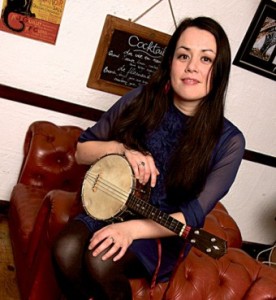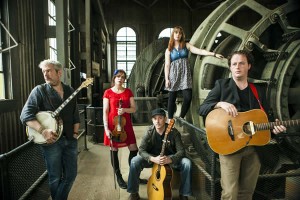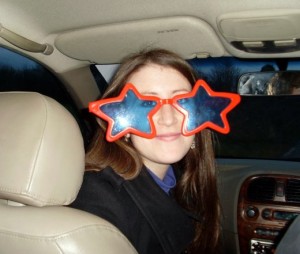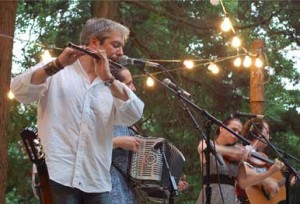What do you say when one of the world’s top Irish bands asks you to be the new lead singer?
Noriana Kennedy thought about her already thriving career. She thought about the demands of touring with a band that spends a lot of weeks on the road. She thought about time away from home and boyfriend.
But in the end, Kennedy, also a skilled banjo player, said yes—an enthusiastic yes—to Philly hometown band Solas.
Here’s how it happened.
Early last summer, Solas was performing in Dublin. Kennedy and the band’s lead singer at the time, Niamh Varian-Barry, were friends, and Kennedy asked whether she could join in, in a supporting role, and the band agreed.
“They took me up on the offer, and I did a solo set with some new songs I wanted to try out. Little did I know Niamh was leaving, and they were sussing me out for the job. A few weeks later, Winnie (Horan, the band’s fiddler and co-founder) texted me to let me know they were interested in having me join the band. I was thrilled and flattered.”
The decision was not a total no-brainer. Kennedy had just recorded an album with her trio, The Whileaways, and they were planning a tour. She also looked forward to recording her second solo album. Kennedy’s career was very much in progress.
“After a bit of thought and conversations with Seamus Egan (multi-instrumentalist and the band’s leader), it seemed right to join the band and balance all three projects.”
Joining a band as well established as Solas, on the other hand, is nothing like a no-brainer. Kennedy’s was a baptism by fire. There was no time for rehearsal in Ireland, so she joined the band for a one-month tour, starting in Philadelphia in July. There were a few days of rehearsal here, and she had been listening to the band’s CDs all along, struggling to memorize tunes. Then, she was off and running. “The first few gigs were daunting!”
Kennedy’s not completely sure why the band saw her as the right choice—”I must ask the lads”—but she suspects at least one of the answers lie in her deep interest in both the Irish and Scottish folk traditions, in combination with her love of American old-timey music. All that, she believes, blends in nicely with the Solas’s sound.
And it helps that she plays 5-string banjo, clawhammer style. Banjo is more than a passing interest for Seamus Egan, one of the world’s foremost tenor banjo players.
The Whileaways continue to figure prominently on Kennedy’s musical horizon. During Solas’s last one-month break, she returned to Ireland to record an EP with her friends. In April, during the next break, she will go back to Ireland to tour with the band, and release a single.
It’s a lot of music to jam into one life, but Noriana Kennedy has never known any other way. As a kid, she listened to everything—rock, reggae, folk, whatever rolled down the pike that engaged her interest. When she was older, she and her brother formed a band that toured five years before marriages and the demands of family put an end to it.
She continued to work as an environmental consultant, but then the recession hit.
“I decided to have a go at playing music in bars around Galway,” Kennedy says. “I’d teamed up with a brilliant Dutch musician who’d just moved to Galway, who sang and looked like Bob Dylan. We formed a group called Mad Uncle Harry, and we had a great following, and gigged four or five times a week.”
All of that gigging offered some useful schooling for a singer on the way up.
“It was a great three years, and great training for me. My voiced developed hugely after singing in bars and trying to be heard.”
If you’ve heard Noriana Kennedy sing, you know she learned her lesson well.
Solas will appear in concert Thursday, February 27, at 8 p.m. Visit st94.com for details.




